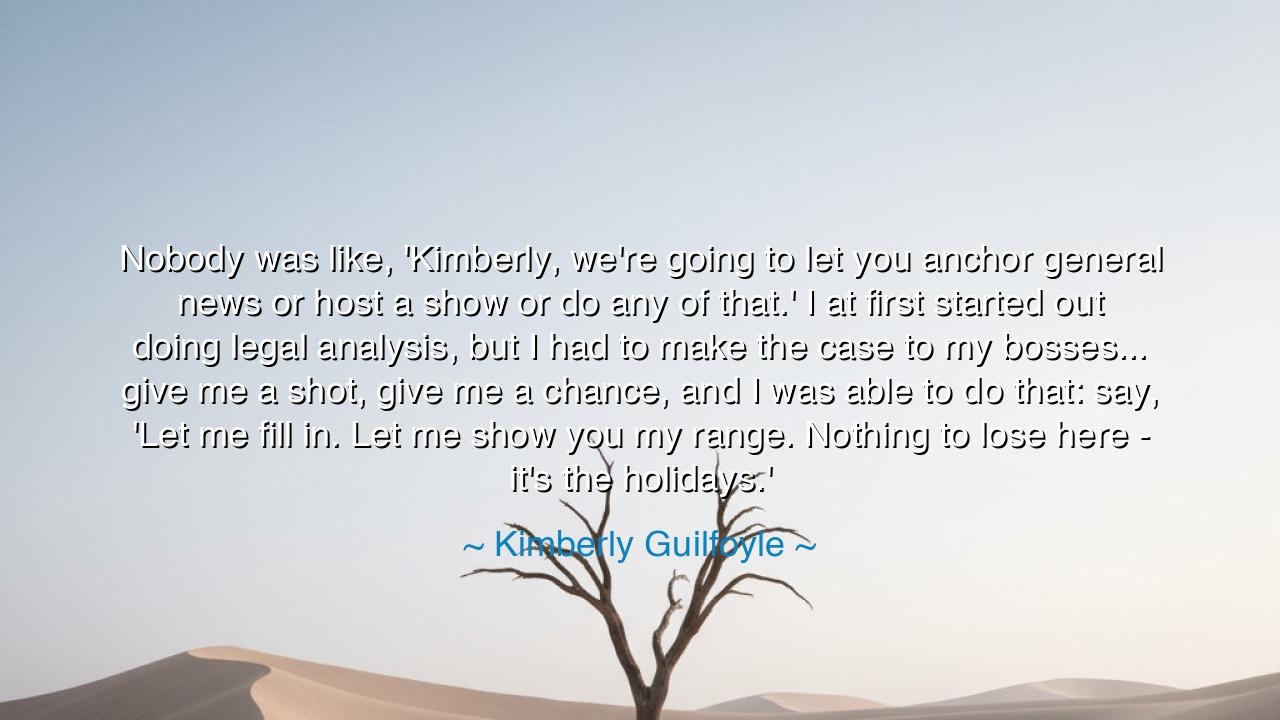
Nobody was like, 'Kimberly, we're going to let you anchor general
Nobody was like, 'Kimberly, we're going to let you anchor general news or host a show or do any of that.' I at first started out doing legal analysis, but I had to make the case to my bosses... give me a shot, give me a chance, and I was able to do that: say, 'Let me fill in. Let me show you my range. Nothing to lose here - it's the holidays.'






The words of Kimberly Guilfoyle carry the cadence of courage and perseverance: “Nobody was like, ‘Kimberly, we're going to let you anchor general news or host a show or do any of that.’ I at first started out doing legal analysis, but I had to make the case to my bosses… give me a shot, give me a chance, and I was able to do that: say, ‘Let me fill in. Let me show you my range. Nothing to lose here - it's the holidays.’” In this passage lies a timeless truth: that opportunity rarely arrives fully formed; it must be demanded, earned, and often seized in moments of daring. Guilfoyle speaks not only of her career in media, but of the universal challenge of proving one’s worth in the face of doubt, skepticism, or indifference.
From the annals of history, we learn that initiative has always been the spark that turns potential into achievement. The ancients understood that the first step often carries the heaviest weight. In the courts of Athens, young rhetoricians would plead before magistrates not merely to demonstrate skill, but to claim the possibility of recognition. They asked, in essence, what Guilfoyle asks: “Give me a chance. Let me show my range.” That spirit, that willingness to step forward despite uncertainty, is the engine of progress. Without it, talent remains hidden, and leadership is claimed only by those who inherit it, not those who earn it.
Guilfoyle’s story originates in the world of broadcast media, where the paths for women, particularly those with backgrounds in law, were historically narrow. She began with legal analysis, a domain respected but constrained, yet she recognized that her skills could translate into broader leadership — into anchoring and hosting. Her insight was simple but profound: one must sometimes act boldly in moments of low risk, such as filling in during the holidays, to reveal the full breadth of capability. By doing so, she transformed limitation into opportunity.
History, too, shows the power of taking the first leap. Consider the story of Harriet Tubman, who, though born into bondage, did not wait for permission to act. She claimed her agency in the darkest of circumstances, guiding hundreds to freedom through the Underground Railroad. She, like Guilfoyle, understood the principle of seizing the moment, demonstrating range and courage in contexts where others assumed there were limits. What appears impossible until acted upon becomes inevitable once initiative takes hold.
Guilfoyle’s reflection also underscores the importance of self-advocacy. In any domain — whether politics, law, or art — the walls of hierarchy and doubt often remain until challenged. By explicitly asking her supervisors for a chance, she converted hesitation into dialogue. The lesson is ancient: kings and magistrates, generals and scholars, have always been moved not solely by merit, but by the audacity of those who claim it. To wait silently for recognition is to accept obscurity; to ask boldly is to claim the first step toward immortality in one’s field.
Moreover, Guilfoyle illustrates the strategy of risk with minimal downside: “Nothing to lose here – it’s the holidays.” Even the ancients understood the wisdom of timing — to act when the stakes are low to demonstrate capacity when the consequences are manageable. Roman generals would test new tactics during training exercises or minor skirmishes, so that innovation could prove itself without threatening the entire legion. So too, she seized a moment that allowed her to expand her responsibilities safely, yet visibly.
The moral of this story resonates across generations: talent alone is insufficient. Courage, strategy, and self-belief are required to transform potential into reality. One must claim opportunity, demonstrate value, and persist through doubt. Without bold action, even the most capable individuals remain confined to narrow roles, their true abilities unseen. Guilfoyle’s narrative exemplifies this: initiative, risk management, and perseverance are the trinity of progress.
So, let her words guide us: when doors appear closed, knock. When opportunity seems limited, create a path. Step forward boldly in the smallest moments, for they are the proving grounds of greatness. Give yourself a chance, show your range, and embrace the moments others overlook. In doing so, you honor the ancient truth: that achievement belongs not to those who wait, but to those who act, daring to claim the life they envision.






AAdministratorAdministrator
Welcome, honored guests. Please leave a comment, we will respond soon